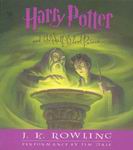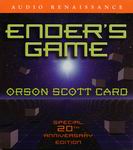
 Harry Potter and the Half-Blood Prince
Harry Potter and the Half-Blood Prince
By J.K. Rowling; Read by Jim Dale
17 CDs – 19 hours [UNABRIDGED]
Publisher: Listening Library
Published: 2005
ISBN: 0307283658
Themes: / Fantasy / Magic / Wizardry / Youth / Magical Creatures / School /
At this point, the Harry Potter universe has become so entrenched in our culture that it’s impossible to approach the newest installment of the series, Harry Potter and the Half-Blood Prince, with anything like objectivity. Most readers already care so much about Harry and his associates that the reading experience has become less like enjoying a good novel and more like continuing the biography of a good friend or beloved celebrity. Which isn’t to say that The Half-Blood Prince isn’t a good novel; on the contrary, it ranks right up there with The Prisoner and Azkaban and The Goblet of Fire, and is a damn sight better than 2003’s gloomy and ultimately disappointing The Order of the Phoenix. For those of us who feel better when things are given in Star Wars terms, The Half-Blood Prince is most similar to The Empire Strikes Back; it advances and complicates our views about the series and its characters, while apparently moving backward from the hero’s inevitable triumph over the villain.
In The Half-Blood Prince, author J.K. Rowling maintains her own tradition of opening the novel without the titular hero in sight. In this case, the muggle Prime Minister of England is anxiously awaiting a visit from the Minister of Magic and reminiscing about their previous, mostly unpleasant, meetings. When Cornelius Fudge arrives, he brings news that the wizarding world is in an uproar; Lord Voldemort is apparently growing more and more powerful, Voldemort’s followers, the Death-Eaters are becoming more brazen in their attacks, and wizards, witches, and muggles are all at increasing risk of severe harm or death.
While Rowling never mentions real-world events in the books, the tone and situations of the two novels published since 9-11 indicate that the world inside her head is not completely insulated from the world outside. It’s telling of Rowling’s own views that the Ministry of Magic is, at best, ineffectual in dealing with these threats, and is often outright dangerous; in The Half-Blood Prince, the Ministry of Magic detains individuals it knows to be innocent, in order to give the appearance of making some progress against the enemy.
The initial expository scene, combined with a tantalizingly ambiguous revelation about one of the Hogwart’s professors, makes for such a dark opening that it’s an almost tangible relief when Harry finally makes an appearance. The likeable young wizard is now 16 years old, and Rowling has again taken pains to ensure that the novel has matured along with Harry. Passages dealing with the magical comeuppance of the Dursleys, the pointless ins and outs of Quidditch matches (why bother with anything but the snitch?), and the minutiae of wizard candy are fleeting and widely spaced, while more chapters are devoted to fairly violent magical battles (a faithful movie adaptation could very well garner an “R” rating), career counseling, and “snogging,” (making out, for those of us on the Yankee side of the pond).
Once the novel starts in earnest, Rowling doesn’t stray from Harry’s point of view, but she cheats somewhat by using the “pensive,” a magical device that allows Harry to explore the memories of others. The pensive is put to good use in the book, as its main function is to investigate the background of “He-who-must-not-be-named.” Readers who are hoping for a complicated, even sympathetic, take on Lord Voldemort (ala Thomas Harris’s Red Dragon) will be disappointed. It turns out that Voldemort is just plain bad, always has been, and apparently, always will be. More psychopath than sadist, Voldemort never hurts or kills just for enjoyment, his villainies are always means to an end. Voldemort’s particular brand of evil means that the guilt that might be expected to accompany these activities just isn’t there.
Other magical items are used less effectively in the story. An episode involving a bottle of “liquid luck”, called “felix felicis,” (the letters of which do not rearrange to spell deus ex machina) feels so contrived, requires a such a lengthy and complicated set-up, and requires Harry, Ron, and Hermione to act so outside their characters, that it’s one of the few times the book feels like something that somebody made up, rather than a description of actual events.
All told, however, the sixth installment in the Harry Potter series is excellent, and the unabridged recording of the novel makes for a very enjoyable listen. The folks at Listening Library made an inspired choice when they chose Jim Dale to read The Sorcerer’s Stone, and, five books, two Audie Awards, five Headphone Awards, three Grammy nominations and one actual Grammy later, his performance of The Half-Blood Prince is, to borrow a word from Harry, brilliant. Even without sound effects, music, or multiple actors, The Half-Blood Prince plays like a good BBC radio drama. Dale lends nuance and individuality to each of the characters, while his “normal,” narration voice is dignified, yet accessible. Dale also has an uncanny knack for interpreting speech adverbs; where Rowling writes “reprovingly,” or “reminiscently”, Dale puts reproach or reminiscence into the dialogue, so much so that very often the listener will be able to predict Rowling’s choice of adverb before Dale reads it. Maybe the highest compliment that can be paid to the audio book is that at no point is the reader reminded of the sub-par (but increasingly better) film adaptations of the books. While listeners who desire an experience closer to reading, with more neutral performances that allow for more personal interpretation, might resent having Dale’s vigorous interpretation thrust upon them, most listeners, particularly younger ones, will enjoy all 19 hours of Harry Potter and the Half-Blood Prince.



 Ender’s Game: Special 20th Anniversary Edition
Ender’s Game: Special 20th Anniversary Edition